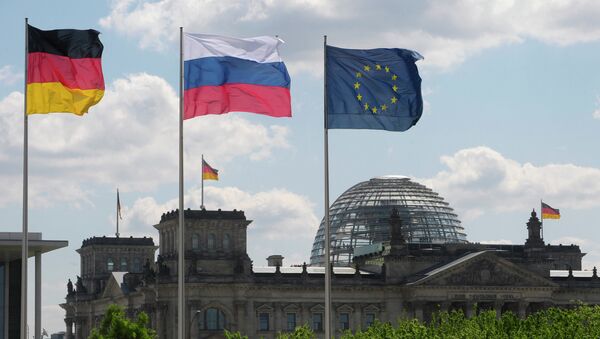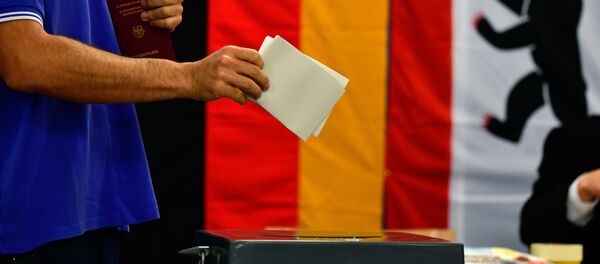BERLIN (Sputnik) — Grinin said Moscow hopes for "renewal of a large-scale political dialogue and the introduction of positive agenda in all areas of cooperation" and expects the new government will adhere to the same policies. Grinin added that there were certain positive signals during the campaign.
The diplomat said that the Russian side hoped for constructive cooperation with both the parties that would form the ruling coalition, as well as with opposition parties.
"Despite certain challenges, the absence of alternatives for our cooperation on a wide range of issues is obvious and it is well understood in Berlin," the ambassador noted.
Germany held a general election on Sunday. The Christian Democratic Union and Christian Social Union (CDU/CSU) alliance got about 33 per cent of votes, the Social Democratic Party (SPD) received 20.5 per cent, while the Euroskeptic Alternative for Germany (AfD) received 12.6 per cent. The Free Democratic Party (FDP) got 10.7 per cent, The Left party received 9.2 per cent and The Greens scored 8.9 per cent.
Bundestagswahl 2017: 12,6 Prozent stimmen für Rassismus und Demokratiefeindlichkeit https://t.co/mK9AszXvtv #btw2017 #zahlen #noafd pic.twitter.com/bzhO37maGe
— Belltower_News (@Belltower_News) September 25, 2017
Grinin pointed out that there was no evidence of Russian attempts to interfere in German parliamentary elections.
"Honestly speaking, firstly, we tried to point at… the lack of evidence and, ultimately, at the absurdity of any insinuations about the Russian interference in German elections. However, later we understood that our efforts would be a priori futile, because most journalists and politicians, who were telling horror stories about Russian hackers and agents of influence publicly, in fact, did not believe in that themselves," the ambassador said.
He said that those, who accused Russia of interference in German elections, had a rich imagination.
"[Russia] as any other state, is guided by its national interests in [foreign] policy, but at the same time it calls for the [mutually] respectful, trust-based dialogue with all the partners," Grinin said.
In 2014, relations between Russia and the Western countries, including Germany, deteriorated over Moscow's alleged involvement in Ukraine conflict and Crimea's reunification with Russia. The European Union imposed several rounds of sanctions on Russia's energy, banking, defence and other sectors, as well as on a number of Russian officials.
However, German Foreign Minister Sigmar Gabriel stressed during his visit to Moscow in March of this year that Berlin had no proof or indication of Russia trying to meddle in its election process. Russia has repeatedly refuted all the accusations of meddling in foreign countries' elections, with Russian Foreign Minister Sergey Lavrov stating that there is no proof to substantiate the allegations, and Kremlin spokesman Dmitry Peskov saying Moscow has never interfered in foreign states' internal affairs and does not intend to do so in the future.



